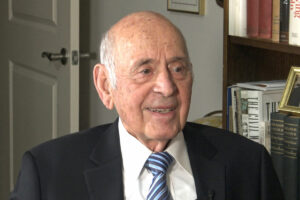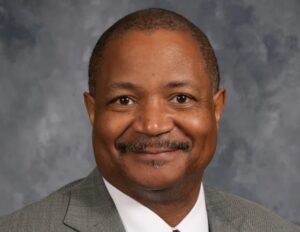Topic: Crime Victim Rights

Interview of Bob Stephan, October 21, 2020
Interviewed by Michael (Mike) Matson
Former Attorney General Robert T. Stephan, in this 2020 oral history interview, recalls the highlights of his years serving the State of Kansas as Attorney General (1979 to 1995). Stephan's career as a champion of children as well as victims of crime and discrimination was shaped by his upbringing in Wichita and his strong sense of what it right. Stephan laments the increasingly partisan atmosphere of the National Association of Attorneys General, an organization to which he belonged during his time in state service.

Interview of Ronald Wurtz, April 18, 2023
Interviewed by Nancy Parrish
Ron Wurtz always wanted to be a lawyer. He chose Washburn University because they had a law school and a ROTC program. He had interned with District Attorney Gene Olander as a law student, and after 4 years as an Air Force JAG, he returned to work as an assistant district attorney in Topeka before becoming a public defender in 1979. Wurtz's interview covers several interesting topics--the death penalty, which he has always opposed, and sentencing guidelines, which he originally supported and later opposed. He discusses several of the cases he had. More recently, he has worked on Show Morethe Expungement Project and now teaches at the Washburn University Law Clinic. Occasionally he has also served as a pro tem judge. Show Less

Interview of Frank Henderson, May 21, 2025
Interviewed by Mark Tallman
At the time when a group of high school students discovered that Fred Seaman, the namesake of District 345 was the Exalted Cyclops of the Ku Klux Klan in the 1920's, Frank Henderson was President of the Seaman School Board. His interview describes the process the board went through to investigate and analyze the students' recommendations to change the district name. At the end of the process, the name stayed, but Fred Seaman's photo and memorabilia were removed from the school buildings and placed in the museum. They aligned the district with the community, not Fred Seaman's Show Moreviews. He said the outcome didn't satisfy anyone but it was unanimous. Henderson's interview describes many challenging situations at the local, state and national level as he served on various state and national boards of education. Henderson and Tallman's exchange highlights major issues in education that affected school boards and local communities. The interview reflects Henderson's view that "Every Student Matters." He believes, "we, as fellow humans, have the responsibility to see the value in every person and do what we can to ...help that person fulfill their potential." Show Less
